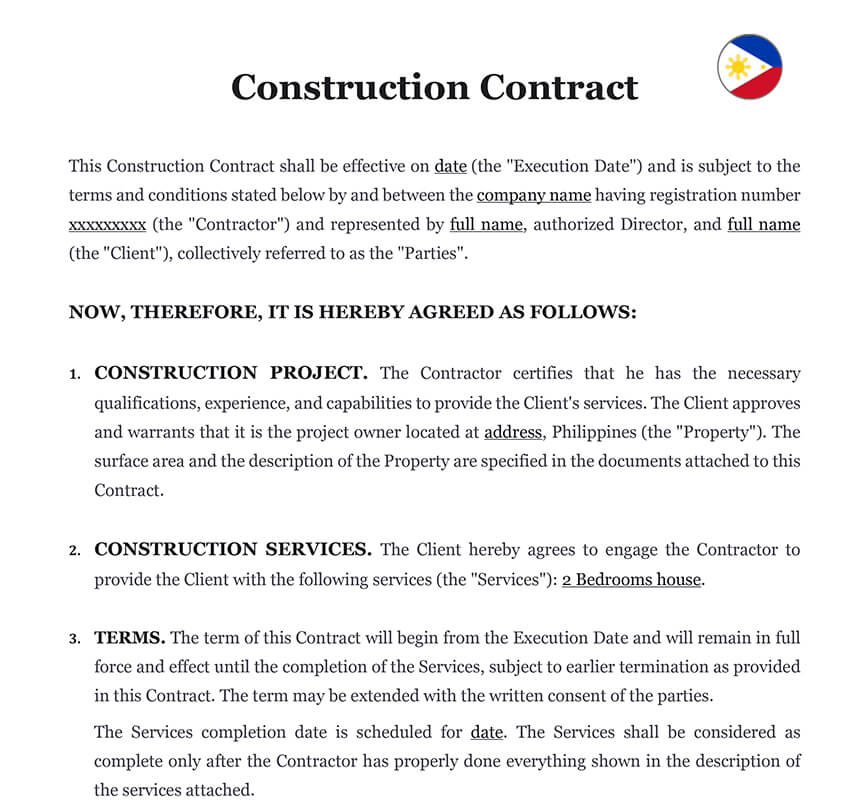Why is it important to draft a building contract in the Philippines?
Drafting a building contract is crucial in the Philippines to ensure a clear understanding and agreement between all parties involved in a construction project. A well-drafted building contract serves as a legally binding document that outlines the rights, obligations, and responsibilities of the parties, helping to mitigate potential disputes and protect their interests. It provides a framework for the construction project, setting expectations and providing guidance on key aspects such as scope of work, timelines, payment terms, quality standards, and dispute resolution mechanisms. By having a comprehensive building contract in place, all parties are safeguarded and can proceed with confidence, knowing their rights and obligations are clearly defined.
What steps should be followed when drafting a building contract in the Philippines?
When drafting a building contract in the Philippines, several important steps should be followed to ensure its effectiveness and enforceability. These steps include:
Step 1. Define the parties and their roles
Clearly identify the client, contractor, and any other relevant parties involved in the project, along with their respective roles and responsibilities.
Step 2. Outline the scope of work
Clearly specify the work to be performed, including the project’s objectives, specifications, deliverables, and any other relevant details.
Step 3. Set timelines and milestones
Establish a realistic timeline for the project, including start and completion dates, as well as any key milestones or deadlines that need to be met.
Step 4. Address payment terms
Clearly outline the payment terms, including the total contract price, payment schedule, and any conditions or provisions related to payment, such as retention amounts or progress payments.
Step 5. Include provisions for changes and variations
Anticipate the possibility of changes or variations during the project and include provisions that outline how such changes will be handled, including the process for documenting and approving changes and any associated costs or time adjustments.
Step 6. Specify quality standards
Clearly define the quality standards and specifications that must be met for the construction work, including materials, workmanship, and compliance with relevant codes and regulations.
Step 7. Address dispute resolution mechanisms
Include provisions for resolving disputes that may arise during the project, such as mediation, arbitration, or litigation, and specify the applicable laws and jurisdiction.
Step 8. Review and finalize the contract
Thoroughly review the contract to ensure accuracy, clarity, and consistency, and seek legal advice if necessary. Once finalized, have all parties sign and date the contract to indicate their agreement and acceptance.
By following these steps, you can create a comprehensive and enforceable building contract that protects the interests of all parties involved in the construction project.
What are the legal requirements and considerations to keep in mind when drafting a building contract in the Philippines?
When drafting a building contract in the Philippines, it is important to consider and adhere to the legal requirements and regulations applicable to construction projects. Here are some key legal requirements and considerations to keep in mind:
1. Compliance with the Construction Industry Authority of the Philippines (CIAP): The CIAP regulates the construction industry in the Philippines and provides guidelines and standard contracts that can be used as a reference when drafting building contracts.
2. Compliance with relevant laws and regulations: Ensure that the building contract complies with applicable laws and regulations, including the Civil Code of the Philippines, the National Building Code, and other relevant legislation.
3. Licensing and registration: Verify that the contractor and other parties involved in the project are duly licensed and registered with the appropriate government agencies, such as the Philippine Contractors Accreditation Board (PCAB).
4. Insurance and bonding: Consider including provisions for insurance coverage and bonding requirements to protect against potential liabilities and risks associated with the construction project.
5. Occupational safety and health: Address occupational safety and health considerations, including compliance with relevant safety regulations, provision of personal protective equipment, and adherence to proper construction practices to ensure the safety of workers and the public.
6. Compliance with environmental regulations: Take into account environmental considerations and ensure compliance with environmental regulations, such as waste management, pollution prevention, and protection of natural resources.
7. Intellectual property rights: Address ownership and use of intellectual property rights related to the project, such as design plans, drawings, and specifications, and specify any restrictions or licensing arrangements.
8. Payment and tax obligations: Comply with tax laws and regulations concerning payments, including withholding tax obligations and reporting requirements.
By considering these legal requirements and considerations, you can draft a building contract that is in compliance with Philippine laws and regulations, minimizing legal risks and ensuring a smooth construction process.
How can you ensure clarity and precision in your building contract in the Philippines?
Ensuring clarity and precision in a building contract is crucial to avoid misunderstandings, ambiguities, and disputes during construction projects in the Philippines. Here are some tips to achieve this: Firstly, use clear and concise language, avoiding complex terms or technical jargon. Secondly, define any technical terms or industry-specific terminology used. Additionally, be specific and detailed when describing the project’s scope of work, specifications, and quality standards. Include clear timelines and milestones, as well as payment terms. Address change orders and variations, and include dispute resolution mechanisms. Seek legal review and advice to ensure compliance with laws and regulations. By following these practices, enhance the clarity and precision of your building contract for a smoother construction process.

What factors should be addressed when determining payment terms and schedule in a building contract?
Determining payment terms and schedules in a building contract is crucial for managing construction projects in the Philippines. To ensure fairness and transparency, several factors need to be considered. These factors include clearly specifying the total contract price, defining a detailed payment schedule, incorporating retention amounts, determining progress payments, establishing a process for variations and change orders, specifying acceptable payment methods, including late payment penalties, and incorporating dispute resolution mechanisms. By addressing these factors, a fair and transparent payment framework can be established in the building contract, ensuring timely and appropriate compensation for construction services rendered.
How should changes and variations be handled in a building contract in the Philippines?
Handling changes and variations in a building contract in the Philippines requires a clear and systematic approach. The process involves defining changes, documenting them in writing, assessing their impact, obtaining written approval, adjusting contract terms, addressing cost implications, maintaining clear communication, and documenting all changes. By following these guidelines, you can effectively manage changes and variations, ensuring transparency, agreement, and proper adjustments to the project’s terms and conditions. This approach helps prevent disputes and ensures that all parties involved are informed and aligned throughout the construction process.











